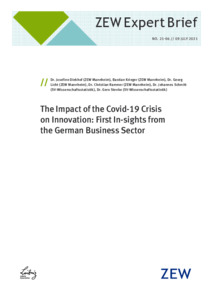|
The impact of the Covid-19 crisis on innovation : first in-sights from the German business sector
Diekhof, Josefine
;
Krieger, Bastian
;
Licht, Georg
;
Rammer, Christian
;
Schmitt, Johannes
;
Stenke, Gero
![[img]](https://madoc.bib.uni-mannheim.de/64011/1.hassmallThumbnailVersion/ZEW_Shortreport2106.pdf)  Vorschau |
|
PDF
ZEW_Shortreport2106.pdf
- Veröffentlichte Version
Download (3MB)
|
|
URN:
|
urn:nbn:de:bsz:180-madoc-640116
|
|
Dokumenttyp:
|
Arbeitspapier
|
|
Erscheinungsjahr:
|
2021
|
|
Titel einer Zeitschrift oder einer Reihe:
|
ZEW-Kurzexpertise
|
|
Band/Volume:
|
21-06
|
|
Ort der Veröffentlichung:
|
Mannheim
|
|
Sprache der Veröffentlichung:
|
Englisch
|
|
Einrichtung:
|
Sonstige Einrichtungen > ZEW - Leibniz-Zentrum für Europäische Wirtschaftsforschung
|
|
MADOC-Schriftenreihe:
|
Veröffentlichungen des ZEW (Leibniz-Zentrum für Europäische Wirtschaftsforschung) > ZEW Kurzexpertisen
|
|
Fachgebiet:
|
330 Wirtschaft
|
|
Abstract:
|
In 2020, firms expected their innovation expenditures to decrease by about 2% in 2020 compared to 2019. This decline is much smaller than that in 2009 following the financial crisis, when innovation expenditures fell by 11%. However, smaller firms with 5 to 99 employees planned to cut their innovation expenditures by 7% to 17 % in 2020. For 2021, firms planned a slight increase in innovation expenditure by 1%. The number of employees in short-time work in Germany peaked at 2.9 million in April 2020, corresponding to a share of 8.7% of all employees. The situation relaxed by October 2020, when the share of short-time workers fell to 2.3%. The most R&D-insensitive industries showed the highest share of short-time work in April 2020 (16.6%), but the lowest in October 2020 (2.0%), indicating that the impact of the crisis on R&D intensive industries weakened in the second half of 2020. This development was strongly driven by the drop of short-time workers in the automobile industry. The recovery of some export-intensive industries, such as the automobile industry, also reflects that firms are starting to adopt and overcome the initially severe disturbances and challenges Covid-19 imposed on international value chains. The global R&D expenditures of large R&D performing German firms declined on average by 1% between 2019 and 2020. However, there are major differences between individual industries. The pharmaceutical and ICT service industries significantly increased their global R&D expenditures, whereas mechanical engineering experienced the sharpest decline in 2020. Firms’ average R&D intensity increased in most industries, except for the electronics/instruments industry and ICT services. Firms with R&D or other innovation activities prior to the crisis more often reported negative impacts of the Covid-19 crisis on their general business activities than firms that do not conduct any R&D or innovation activities. This result may be linked to the fact that the crisis had a more severe impact on firms with a more complex internal organisation and more international activities, both of which are typical for R&D and innovation performing firms. The most common strategic responses of firms to the Covid-19 crisis were i) to enhance the digitalisation of their internal processes and ii) to extend their digital offers and sales channels. Both responses were mostly of permanent nature. Reorganising sales towards domestic customers and removing products or services from their portfolio were less common responses. The most frequent crisis-related changes in firms’ innovation activities include i) the extension of innovation projects and ii) a reduction in the number of innovation projects due to a lack of impulses for innovation. Reducing collaborations and withdrawing from all innovation activities were less frequent changes.
|
 | Das Dokument wird vom Publikationsserver der Universitätsbibliothek Mannheim bereitgestellt. |
 Suche Autoren in Suche Autoren in
BASE:
Diekhof, Josefine
;
Krieger, Bastian
;
Licht, Georg
;
Rammer, Christian
;
Schmitt, Johannes
;
Stenke, Gero
Google Scholar:
Diekhof, Josefine
;
Krieger, Bastian
;
Licht, Georg
;
Rammer, Christian
;
Schmitt, Johannes
;
Stenke, Gero
Sie haben einen Fehler gefunden? Teilen Sie uns Ihren Korrekturwunsch bitte hier mit: E-Mail
Actions (login required)
 |
Eintrag anzeigen |
|
|



 Suche Autoren in
Suche Autoren in